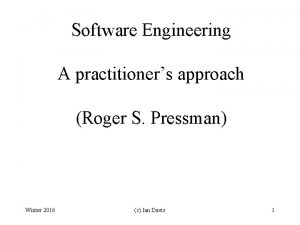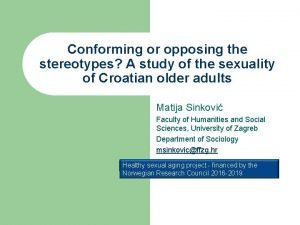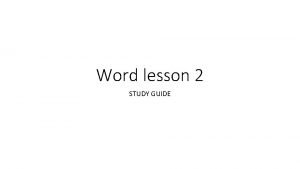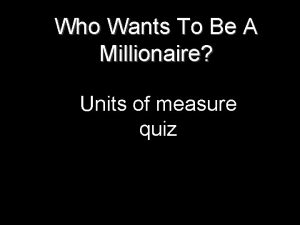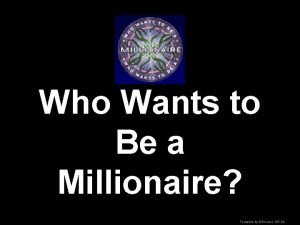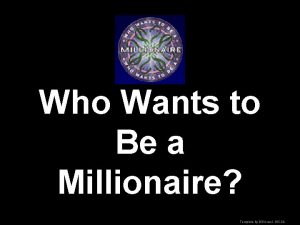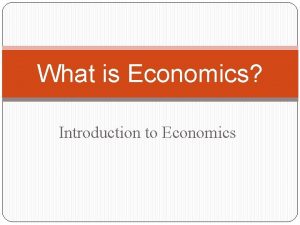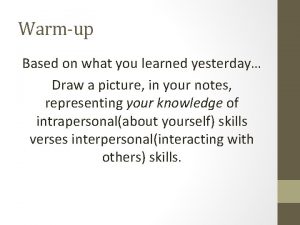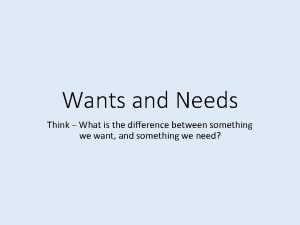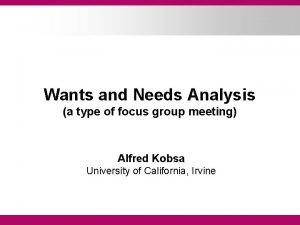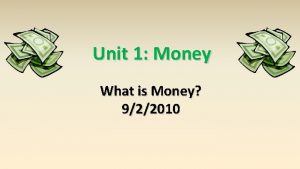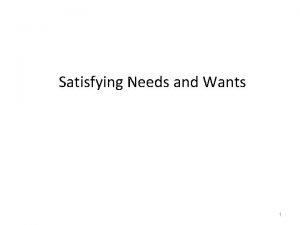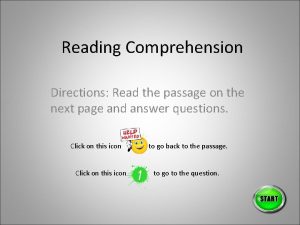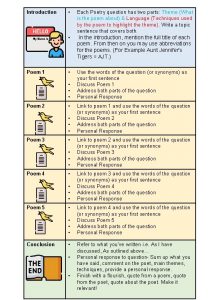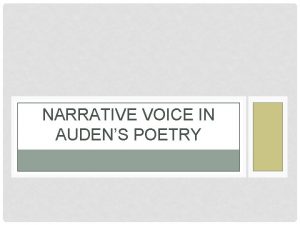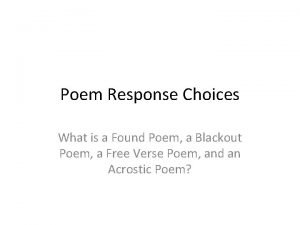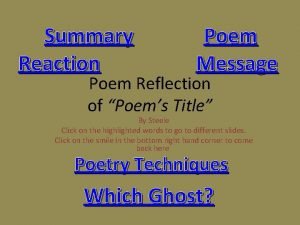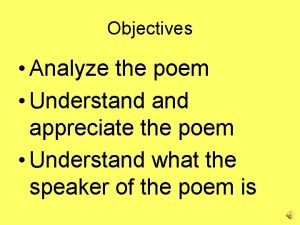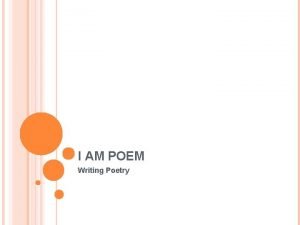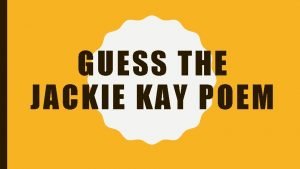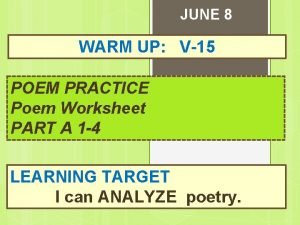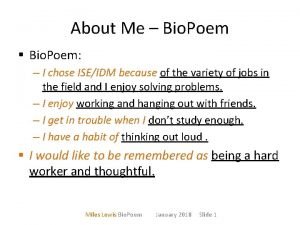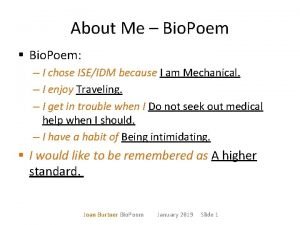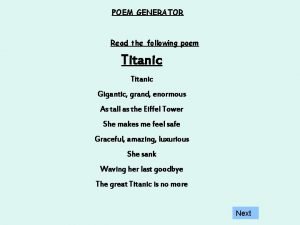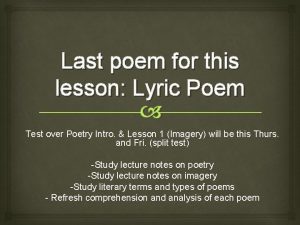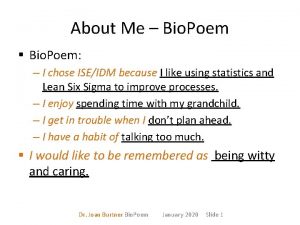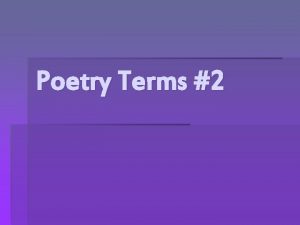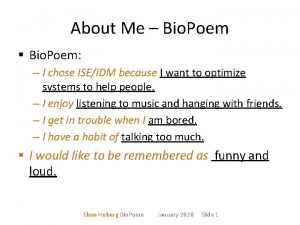MindsOn Audens poem Conforming to what society wants






















- Slides: 22

Minds-On • Auden’s poem– Conforming to what society wants us to do. – We did not come to an agreement whether the speaker of the poem was happy or complacent or distressed. – Easy to apply Marxist literary lens to this poem because it highlighted the class differences. – One can also apply a Psychoanalytic literary lens to this poem for how the speaker has to adhere to societal strictures. Can we add anymore to our analysis? Any ideas you do not agree with? Or any ideas with which you do not agree? LOL Do you agree with the essay?

Dystopia • Dys = bad • Topia = place What’s the opposite of a dystopia?

Dystopia In literature, a dystopia is a futuristic, imagined universe in which oppressive societal control and the illusion of a perfect society are maintained through corporate, bureaucratic, technological, moral, or totalitarian control. Dystopias, through an exaggerated worst-case scenario, make a criticism about a current trend, societal norm, or political system.

Characteristics of Dystopian Society • Propaganda is used to control the citizens of society • Information, independent thought, and freedom are restricted

Characteristics of Dystopian Society • A figurehead or concept is worshipped by the citizens of the society

Characteristics of Dystopian Society • Citizens are perceived to be under constant surveillance

Characteristics of Dystopian Society • Citizens live in fear of the outside world • The natural world is banished and distrusted

Characteristics of Dystopian Society • Citizens live in a dehumanized state

Characteristics of Dystopian Society • Citizens conform to uniform expectations. Individuality and dissent are bad.

Characteristics of Dystopian Society • Society is an illusion of a perfect utopian world.

What are your initial thoughts about the exposition? • To know George Orwell’s intentions. • To understand how his intentions are carried out by reading the Chapters 1 and 2. • To be able to analyze the exposition of the novel, and the Acts of Communion. Dystopian; Exposition; Characterization; Setting; Communion

1. To assure our country‘s freedom, the government should be able to spy on its citizens. 2. Patriotism means supporting your government during times of war. 3. The government has a right to know what people are reading so they may determine who might be a threat. 4. Society would be safer if we had security cameras in public places to catch potential criminals. 5. The only way to prepare for peace is to be prepared for war. 6. For an idea to exist, we must have words to express it. 7. People like to read about people/societies suffering.

To know George Orwell’s intentions. • Eric Arthur Blair, known by his pen name, George Orwell. • Born on June 25 th, 1903 in India. Was raised in England. • His works often explored issues of social injustice and an opposition to totalitarianism. • Animal Farm and 1984 (published in 1949) are his two most memorable works. Dystopian; Exposition; Characterization; Setting; Communion

http: //www. slideshare. net/lramirezcruz/1984 orwell-ppt

To know George Orwell’s intentions. To understand how his intentions are carried out by reading the Chapters 1 and 2. • George Orwell’s Why I Write is an essay? What did you think about his essay? Would you classify it an essay? What made it a weak or strong essay? • According to Orwell what makes a writer? • What were his thoughts about society? Dystopian; Exposition; Characterization; Setting; Communion


To understand how his intentions are carried out by reading the Chapters 1 and 2. To be able to analyze the exposition of the novel, and the Acts of Communion. • Let’s read chapter 1. • The answer that you write from the questions are important. • You should also write down the page numbers with important quotations. Dystopian; Exposition; Characterization; Setting; Communion


To be able to analyze the exposition of the novel, and the Acts of Communion. Thomas C. Foster’s Nice to Eat with You: Acts of Communion • Eating together means coming to common ground. Whenever characters eat together, they’re communing. Not every act of communion has to be holy, or even pretty, and some don’t even involve food, but they all serve that function: bonding. Dystopian; Exposition; Characterization; Setting; Communion

To be able to analyze the exposition of the novel, and the Acts of Communion. • Describe the meal. • Where does the meal take place? • What type of food does Winston consume? • How does Winston respond to the meal? • What does this meal scene teach us? Why does Orwell make it Winston's FIRST meal? Dystopian; Exposition; Characterization; Setting; Communion

To understand how his intentions are carried out by reading the Chapters 1 and 2. To be able to analyze the exposition of the novel, and the Acts of Communion. Can we apply any of the questions using the literary theories? Anything you don’t understand? 1984 comic. com

Homework • Read chapters 2 -4 for homework. • Answer the questions in your notes.
 Storming norming conforming performing
Storming norming conforming performing Mesh metrics ansys
Mesh metrics ansys Conforming to stereotypes
Conforming to stereotypes Non-conforming material report
Non-conforming material report Gertler econ
Gertler econ Needs and wants
Needs and wants Sally wants to select an entire paragraph
Sally wants to select an entire paragraph Who wants to be a millionaire scale
Who wants to be a millionaire scale P x p x p x p
P x p x p x p Who wants to be a millionaire template
Who wants to be a millionaire template Millionaire question template
Millionaire question template Who wants to be a millionaire a b c d
Who wants to be a millionaire a b c d Needs vs wants examples
Needs vs wants examples Hierarchy of wants
Hierarchy of wants Needs vs wants examples
Needs vs wants examples Needs and wants analysis
Needs and wants analysis A double coincidence of wants
A double coincidence of wants Slidelizard who wants to be a millionaire
Slidelizard who wants to be a millionaire Super manager
Super manager Satisfying needs 7
Satisfying needs 7 David wants to buy a christmas present for a very
David wants to buy a christmas present for a very Open billing meaning
Open billing meaning Mathionaire
Mathionaire
